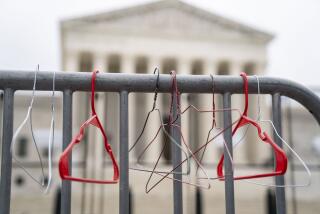A sound choice
- Share via
In presenting U.S. Circuit Court Judge Sonia Sotomayor as his first nominee to the Supreme Court, President Obama rightly observed :_Obama_s_remarks_on_choice_of_Sonia_Sotomayor_for_Supreme_Court/ that few presidential decisions are more consequential than choosing a justice. Obama has discharged that responsibility admirably, without ignoring considerations of gender and ethnic diversity. Although Sotomayor must withstand scrutiny from the Senate, barring some unlikely revelation of impropriety she should be confirmed expeditiously, in time to join the court for its fall term.
Sotomayor doesn’t possess the political experience that would be brought to the court’s cloistered chambers by Michigan Gov. Jennifer Granholm or Homeland Security Secretary Janet Napolitano. But she satisfies Obama’s other criteria: experience, erudition and, as he put it, “a common touch and a sense of compassion, an understanding of how the world works and how ordinary people live.”
This was a sensible reformulation of the president’s insistence that he was looking for a justice with “the empathy to recognize what it’s like to be a teenaged mom; the empathy to understand what it’s like to be poor or African American or gay or disabled or old.” Conservatives pounced on the empathy standard, arguing that it conflicted with a judge’s oath to “do equal right to the poor and to the rich.” But Obama’s point was that the court benefits when justices have a lived experience of the law rather than a more abstract appreciation for doctrine.
Sotomayor is being criticized for a similar observation in a 2001 lecture in which she said: “I would hope that a wise Latina woman with the richness of her experiences would more often than not reach a better conclusion [as a judge] than a white male who hasn’t lived that life.” Sotomayor may have been loose with her words, but her point is sound. In some cases, the gender of a judge will shape his or her legal analysis, as Justice Ruth Bader Ginsburg demonstrated in dissents when her male colleagues adopted a blinkered view of sex discrimination in the workplace. Congress has since agreed with Ginsburg in one of those discrimination cases and adopted her view as law.
Sotomayor’s experiences as a Latina raised in a housing project who went on to excel at Princeton and Yale don’t in themselves qualify her for the court. They do, however, complement her sterling credentials and equip her with perspectives that could illuminate legal issues that come before her. So does her experience as a trial judge, applying the often abstract rulings of the Supreme Court to particular cases. None of the eight justices she would join has comparable experience.
Early reactions to the Sotomayor nomination from conservative commentators have been predictably scathing, with that noted legal scholar Rush Limbaugh proclaiming that she was a “horrible pick.” (We eagerly await Dick Cheney’s latest thoughts.) Republicans in the Senate have been more cautious, perhaps reflecting a fear of piling on the first Latina to be nominated to the court. Senate Minority Leader Mitch McConnell (R-Ky.) said that Republicans “will thoroughly examine her record to ensure she understands that the role of a jurist in our democracy is to apply the law evenhandedly, despite their own feelings or personal or political preferences.”
Fair enough, but Sotomayor could still be subjected to an ideological interrogation or retaliation for the rough treatment received by President George W. Bush’s nominees. That would be an injustice -- and politically risky. As we have observed before, presidents are entitled to deference from the Senate when they nominate jurists who possess excellent legal credentials and views -- liberal or conservative -- that fall within the mainstream. That’s why this page supported the confirmation of Chief Justice John G. Roberts Jr. Sotomayor seems squarely within that tradition.
Republicans are free to press Sotomayor for her views about the role of appellate courts and the interaction of life experience and legal interpretation. What they shouldn’t do is demonize her for a single decision (such as a Connecticut affirmative-action ruling that we too questioned and that is under review by the high court) or a single comment (such as her 2005 observation that, in legal terms, an appeals court is “where policy is made”). Finally, they should resist the temptation to accuse her of “judicial activism,” a canard used by conservatives and liberals to deride decisions they disagree with. In short, the Senate’s Republican minority should accord her the same respect it demanded for Bush’s nominees and end the tiresome tit-for-tat that has cheapened the confirmation of federal judges and deprived the bench of some of the nation’s most capable legal minds.
More to Read
Get the L.A. Times Politics newsletter
Deeply reported insights into legislation, politics and policy from Sacramento, Washington and beyond. In your inbox twice per week.
You may occasionally receive promotional content from the Los Angeles Times.










